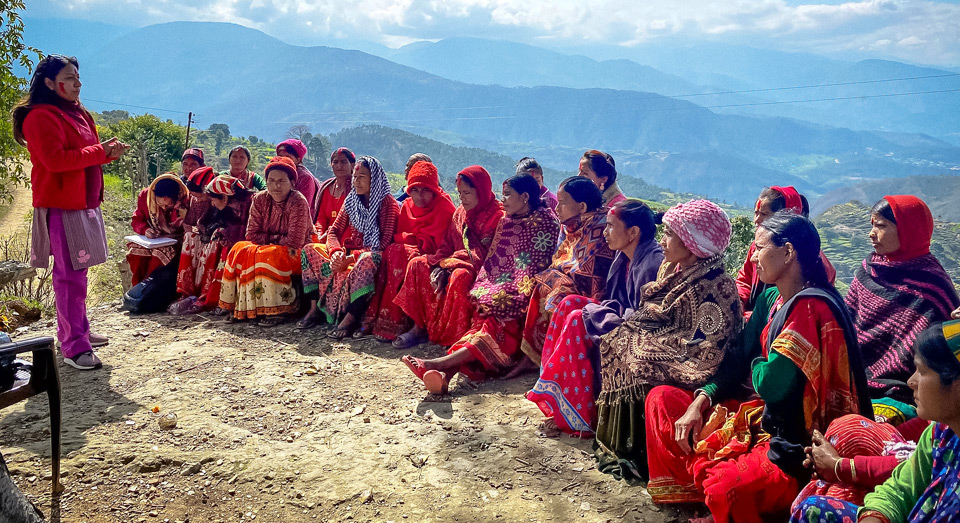Thematic focus areas
The following themes intersect and crosscut with programme’s output areas and are central to our implementation activities across the priority countries.

Launched in 2018, the ‘Enhancing Access to Justice for Women in Asia and the Pacific’ is a Regional Programme, jointly implemented by UN Women, the International Commission of Jurists (ICJ), and OHCHR, with generous support from the Government of Sweden, with the goal to enhance access to justice for women in formal and community-based justice systems in Asia and the Pacific, with a focus on Indonesia, Nepal, the Philippines, Timor-Leste and the Solomon Islands.
The programme promotes a coordinated response, by bringing together justice providers, women civil society organizations, human rights defenders and whole communities to collaborate towards gender-responsive justice.
Elimination of gender-discriminatory attitudes and stereotyped behaviours towards women in the formal justice chain and in community-based mechanisms across the region. Promoting the adoption of domestic laws and court decisions that are consistent with international human rights law and standards, including CEDAW and the Bangkok General Guidance for Judges on Applying a Gender Perspective in Southeast Asia.
Building the capacity of front-line formal justice actors to eliminate gender-discriminatory attitudes and behaviours towards women
Working closely with lawyers and law enforcement officers is key as they are the first point of contact with women, and can enable or hinder their real ability to access justice. Thus, through the partnership with the International Commission of Jurists (ICJ), a series of gender-responsive trainings were conducted for lawyers of the Integrated Bar of the Philippines (IBP) and National Police Commission (KOMPOLNAS) of Indonesia.
National Judicial Dialogue on the Elimination of Discrimination Against Women and Enhancing Women’s Access to Justice
The ICJ, in collaboration with the Sri Lanka Judges' Institute (SLJI) and Nepal Judicial Academy (NJA), co-hosted the National Judicial Dialogue on the Elimination of Discrimination Against Women and Enhancing Women’s Access to Justice in the respective countries (August 2020, March 2021). The dialogues highlighted how women in Sri Lanka and Nepal continue to face a myriad of challenges when accessing justice, including legal, institutional and cultural barriers.
Regional Judicial Dialogue on Women’s Access to Justice
Through the partnership with ICJ, and in collaboration with the Office of the United Nations High Commissioner for Human Rights (OHCHR) and the Federal Court of Malaysia, the 2019 Southeast Asia Regional Judicial Dialogue was hosted in Kuala Lumpur. The event brought together formal and informal justice actors to promote the use and application of the Bangkok General Guidance for Judges in Applying a Gender Perspective to enhance Women’s Access to Justice, and to raise awareness of their role in upholding international laws on women’s rights, including CEDAW. The judges from Indonesia, Malaysia, Philippines and Timor-Leste discussed how to apply CEDAW and other international legal instruments in their work at the domestic level to eliminate the negative impact of stereotyping and gender bias in the judiciary.
We empower grassroots women’s organizations to document, monitor, liaise and facilitate interactions with formal and informal justice providers so that they can take a leading role in the design of a community-based approach to gender justice.
Piloting a community-based approach to gender justice in Indonesia, Nepal, Philippines and Timor-Leste
As part of the programme, UN Women, together with grassroots and civil society organizations, community-based justice actors, women human rights defenders, justice providers, and local governments, have piloted community-based interventions aimed at increasing women’s access to justice and fostering gender-responsive people-centered justice.
Across all four countries, the pilot models have been recognized by local community members and national partners as a successful approach to enhancing women’s access to and participation in justice systems. The programme has contributed to building more just, inclusive and peaceful societies, in line with Sustainable Development Goal 5 and Goal 16.
Women Human Rights Defenders have the knowledge and know-how to use United Nations Human Rights mechanisms and to engage with government representatives to address human rights issues pertaining to Women’s Access to Justice - in both formal and informal justice contexts.
Human rights training on environmental protection and land rights across the region
In August 2019, in close cooperation with the United Nations Expert Mechanism on Rights of Indigenous Peoples, the Women’s Access to Justice programme co-organized a workshop for indigenous youth human rights defenders in Bangkok. The event provided a safe space for 29 participants to discuss human rights, women’s rights and climate justice issues.
Through its partnership with OHCHR, the Women’s Access to Justice programme will organize four human rights capacity-building workshops for selected women human rights defenders with a focus on the documentation and reporting on human rights violations and the use of the United Nations human rights mechanisms.
Establishing a unified movement of Women Human Rights Defenders in the Pacific
In July 2019, the Pacific Human Rights Defenders Network was launched in Fiji with support from the Women’s Access to Justice programme. The purpose of the network is to promote the protection of human rights and to ensure the collective protection and empowerment of human rights defenders in the Pacific region with a special emphasis on women and gender non-conforming human rights defenders. The network currently has over 100 human rights defenders, the majority of whom are women. Key priorities for the network include providing technical assistance and strengthening the Pacific Human Rights Defenders Network to formulate a protection strategy for human rights defenders across the Pacific Islands.
The following themes intersect and crosscut with programme’s output areas and are central to our implementation activities across the priority countries.
